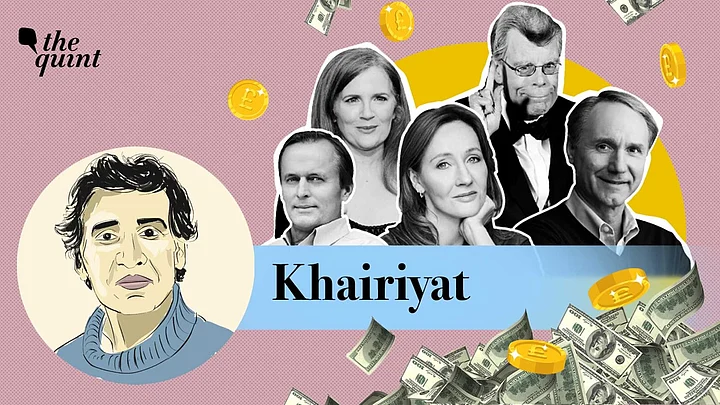I do not write in Urdu or Hindi (or Danish), though I know these languages. I write in English. I wish I wrote in Hindi. I also wish that I wrote pulp literature not literary novels, in Hindi. Because, then, I could have written this letter:
Dear One Percent Author,
I read, once again, another scintillating article by you castigating the top one percent of rich people in the world for owning fifty percent of its wealth. I totally agreed with your sentiments in that article, and I admire both your mastery of facts and the language in which you express them.
However, as this letter marks the scheduled publication of another brilliant book by you, which is already being lauded in the top one percent literary publications of the world—I could not help wondering if you notice the ghostly connections between yourself and the top one percent of billionaires who rightly earn your wrath?
Writers Are a Rich Class
You see, it has been suggested that while capital is the God Almighty in our world, there are also various privileged realms ruled by other gods. There is the god of fashion, the god of culture, the god of literature, and so on. Finally, all these little gods have to kowtow to the One Almighty God of Capital in our world, or the One God’s talibans and rakshaks of bankers, day traders, CEOs and politicians would come calling, but that does not mean the little gods are powerless in their own little spheres.
If the God of Capital has its select priesthood – the one percent you rightly castigate for owning fifty percent of the wealth of the world – then, alas, the god of culture, the god of literature and so on also have their little priesthoods. I wonder if you have ever paused to consider that you belong to the one percent of writers who get fifty percent of the attention and advances of the literary world?
Some days ago, I read a report from a 2003 survey of writers’ earnings in the UK. It reminded me a lot of the figures that you quoted against those greedy one percent billionaires squatting on fifty percent of the world’s wealth. It showed that the top five percent of British authors pocket fifty percent of all earnings.
Moreover, the top one percent have a mean average annual income (from writing) of more than £450,000, according to the Authors’ Licensing & Collecting Society while the bottom fifty percent make an average of only about £10,000 per head.
Class Divide in the World of Words
Recent reports and surveys have suggested that this divide is growing wider per year – just as the divide between the very rich and the middle class is growing bigger every year. I know the matter is similar in India or USA.
Now, however, capital might be the main index of wealth among billionaires, but it is by no means the only one among writers. Literary attention and media coverage count for as much, and one of the reasons why you belong to the top one percent is that your books get reviewed in publications like the London Review of Books, New Yorker, and New York Times, the moment they appear – actually, often two to three days before they appear. Moreover, they get reviewed individually by astute literary critics or other one percent writers, and are not just bundled up with three other books and sent to an area expert or an overworked journalist to vent on.
As a writer who can claim to belong somewhere between the top ten and twenty percent bracket in terms of visibility, I can assure you that this is not the case with even writers of my kind of visibility – not to mention the poor blighters struggling in the bottom fifty percent.
Interestingly, this difference does not have to do with the quality of writing all the time. There is an interesting overlap and contrast between the over-class in the world of finance and that in the world of literature (and culture, in general).
When Culture Meets Crony Capitalism..
Do you recall when Donald Trump, who has been so wonderfully honest about being dishonest, incensed you and others like you by conceding that he has not been paying taxes, and explained it away by noting that it made him ‘smart’?
I was provoked too, I confess, for I pay my taxes like most other middle class wage-earners. I recall that you, or one of your elite writer friends, had correctly pointed out that it was not Trump who was ‘smart’ but the lawyers and accountants that he bought with his (partly inherited) capital.
Now, in the literary world, the success of a writer depends largely I would say, though there are some who would rashly say ‘entirely’ – on the smart people behind him or her. The agents, editors, literary friends, publicity managers etc.
It depends also on having gone to top schools and universities, and similar kinds of cultural inheritance. I imagine it cannot hurt if you and the editor of some Big Boom Magazine were at Oxford or Harvard together. In short, I cannot help feeling that there is a great resemblance between you and not just the one percent you castigate, but the very epitome of that one percent, its great champion— Shri Donald Trump, whom you so rightly detest.
Yours sincerely,
Bhasha pulp writer
(Tabish Khair, is PhD, DPhil, Associate Professor, Aarhus University, Denmark. He tweets @KhairTabish. This is an opinion article and the views expressed are the author’s own. The Quint neither endorses nor is responsible for them.)
(At The Quint, we question everything. Play an active role in shaping our journalism by becoming a member today.)
